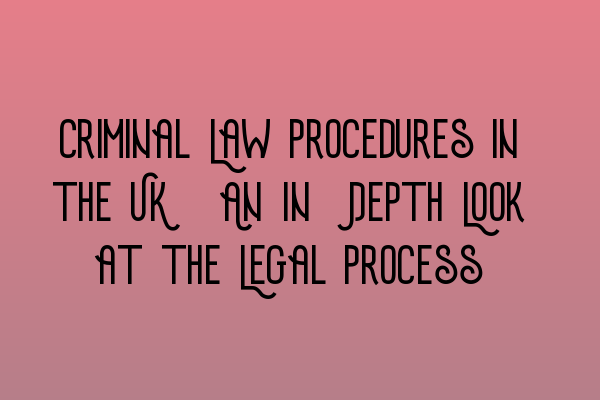Criminal Law Procedures in the UK: An In-Depth Look at the Legal Process
When it comes to understanding criminal law procedures in the UK, it is essential to have a comprehensive knowledge of the legal process. Whether you are a law student preparing for the SQE exams or a practicing solicitor, having a clear understanding of the steps involved in criminal law proceedings is crucial. In this article, we will delve into the details of the criminal law procedures in the UK, providing you with an extensive overview of the legal process.
1. Investigation and Arrest
The first stage in the criminal law process is the investigation and arrest. Once a crime has been reported to the police, they will carry out a thorough investigation to gather evidence and identify potential suspects. This investigation may involve gathering witness statements, collecting physical evidence, and conducting interviews. If there is sufficient evidence to suggest that a person has committed an offense, the police can proceed with an arrest. During an arrest, the suspect will be informed of their rights and taken into custody for questioning.
2. Charging
After the arrest, the police will assess the evidence gathered during the investigation and make a decision on whether to charge the suspect. If there is enough evidence to support a prosecution, the suspect will be formally charged with the offense. At this stage, it is imperative for the suspect to seek legal advice and representation to ensure their rights are protected throughout the legal process.
3. Bail Hearing
Following the charging stage, a bail hearing may take place. Bail allows a person to be released from custody while awaiting trial. During the bail hearing, the court will assess factors such as the seriousness of the offense, the likelihood of the suspect absconding, and the risk of interference with the case. If bail is granted, the suspect will be released from custody, but they may be subject to certain conditions, such as surrendering their passport or adhering to a curfew.
4. Plea and Case Management Hearing
Once the suspect has been charged and released on bail, the next stage in the criminal law process is the Plea and Case Management Hearing (PCMH). The PCMH is a court hearing where the defendant is expected to enter their plea and the court will set a timetable for the proceedings. This hearing provides an opportunity for the defendant to negotiate a plea bargain with the prosecution or to raise any legal issues that may affect the case.
5. Trial
If a plea bargain is not reached during the PCMH, the case will proceed to trial. The trial is the most critical stage in the criminal law process. It provides an opportunity for both the prosecution and the defense to present their arguments and evidence before a judge or a jury. The burden of proof lies with the prosecution, who must prove the defendant’s guilt beyond a reasonable doubt. The defendant has the right to be represented by legal counsel and to challenge the prosecution’s case.
6. Verdict and Sentencing
After the trial, the court will reach a verdict based on the evidence presented. If the defendant is found guilty, the court will proceed to sentencing. The sentencing stage is where the court determines the appropriate punishment for the offense committed. The court will consider factors such as the seriousness of the offense, any mitigating or aggravating circumstances, and any previous convictions. The sentencing can range from fines and community service orders to imprisonment.
It is important to note that the criminal law procedures can vary depending on the specific circumstances of each case. The above steps provide a general overview of the legal process, but it is always advisable to seek professional advice and stay updated with the latest legal developments.
For more information on criminal law procedures and to prepare for your SQE exams, check out our related articles:
- SQE 1 Practice Exam Questions
- SQE 1 Practice Mocks FLK1 FLK2
- SQE 2 Preparation Courses
- SQE 1 Preparation Courses
- SRA SQE Exam Dates
Stay informed, stay prepared, and build a strong foundation in criminal law procedures to excel in your legal career.
